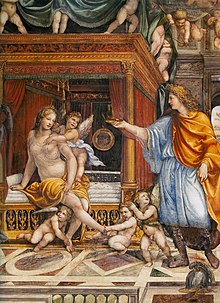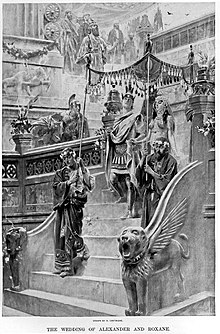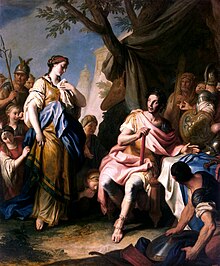
Roxana

You can help expand this article with text translated from the corresponding article in German. (April 2017) Click [show] for important translation instructions.
|
| Roxana | |
|---|---|
 Marriage of Alexander and Roxana by Il Sodoma | |
| Born | Bactria |
| Died | 310 BC Amphipolis, Macedon, Ancient Greece |
| Spouse | Alexander the Great |
| Issue | Alexander IV |
| Father | Oxyartes |
| Religion | Zoroastrianism |
Roxana (dead 310 BC,[1] Ancient Greek: Ῥωξάνη; Old Iranian: *Raṷxšnā- "shining, radiant, brilliant") sometimes known as Roxanne, Roxanna and Roxane was a Sogdian[2][3] or a Bactrian[4] princess whom Alexander the Great married after defeating Darius, ruler of the Achaemenid Empire, and invading Persia. The exact date of her birth is unknown, but she was probably in her early teens at the time of her wedding.

Biography
Roxana was born as the daughter of a Bactrian nobleman named Oxyartes, who served Bessus, the satrap of Bactria and Sogdia.[1] He was thus probably also involved in the murder of the last Achaemenid king Darius III. After Bessus was captured by the Macedonian ruler Alexander the Great, Oxyartes and his family continued to resist the Macedonians, and, along with other notables such as the Sogdian warlord Spitamenes, took up a defensive position in a fortress known as the Sogdian Rock.[5]

They were eventually defeated by Alexander, who attended a celebration,[6] and reportedly fell in love with Roxana on sight.[7] The location of the celebration took place is disputed,[6] possibly in the Sogdian Rock or another fortress of Chorienes (also called Sisimithres by Quintus Rufus Curtius), but according to the Metz Epitome it was in the house of Chorienes in which Roxana was introduced to Alexander as the daughter of Oxyartes.[8][6] Curtius apparently misrepresented Roxana as a daughter of Chorienes.[6] Arrian states that Oxyartes surrendered to Alexander when he became aware of the good reception Alexander awarded his daughter Roxana.[6] A.B. Bosworth mentions the possibility of Roxana being captured at the Sogdian Rock, but that the two married at the fortress of Chorienes.[6] The marriage was in 327 BC, and according to the majority of the sources it was in the Macedonian rite rather than the Persian.[9] The sources agree that Alexander fell passionately in love with her, but considering that he had difficulties in occupying and controlling Sogdiana his decision to marry Roxana may also have been motivated by the advantages of a political alliance.[10]



Alexander married Roxana despite opposition from his companions[11][9] who would have preferred a Macedonian or other Greek to become queen.[12] However, the marriage was also politically advantageous as it made the Sogdian army more loyal towards Alexander and less rebellious after their defeat.[13] Alexander thereafter made an expedition into India and while there he appointed Oxyartes as the governor of the Hindu Kush region adjoining India.[1] Roxana accompanied Alexander into India, where her first son died at or soon after birth near the banks of the Acesines River [14] in November 326 BC.

When Alexander returned to Susa in spring 324 BC, he promoted a brother of Roxana to the elite cavalry.[5][1] To encourage a better acceptance of his government among the Persians, Alexander also married Stateira II, the daughter of the deposed Persian king Darius III.[1]

After Alexander's sudden death at Babylon in 323 BC, Roxana is believed to have murdered Stateira. According to Plutarch, she also had Stateira's sister, Drypetis, murdered with the consent of Perdiccas.[15] Roxana was pregnant, which caused some discussions between Alexander's loyalists around Perdiccas[16] and Ptolemy[17] who suggested waiting to see if Alexander's posthumous child was a son and naming either a caretaker regent or a council to govern on his behalf, and the Macedonian soldiers who opposed a so-called persianization of the Macedonian court.[16]

For the Macedonian succession a temporary compromise was found as Philip Arrhidaeus was declared king of Macedon; if the unborn child was a son, he was to become a king as well.[18] By 317 though, Roxana's son, called Alexander IV lost his kingship as a result of intrigues started by Philip Arrhidaeus' wife, Eurydice II.[1] Afterwards, Roxana and the young Alexander were protected by Alexander the Great's mother, Olympias, in Macedonia.[19] Following Olympias' assassination in 316 BC, Cassander imprisoned Roxana and her son in the citadel of Amphipolis.[20] Their detention was condemned by the Macedonian general Antigonus in 315 BC.[21] In 311 BC, a peace treaty between Antigonus and Cassander confirmed the kingship of Alexander IV but also Cassander as his guardian,[21] following which the Macedonians demanded his release.[22] However, Cassander ordered Glaucias of Macedon to kill Alexander and Roxana.[23] It is assumed that they were murdered in spring 310 BC, but their death was concealed until the summer.[24] The two were killed after Heracles, a son of Alexander the Great's mistress Barsine, was murdered, bringing the Argead dynasty to an end.[20]

Legacy
- Asteroid 317 Roxane is named in her honor.[25]
- At the Acropolis, there were found inscriptions of offerings Roxana dedicated as Alexander's wife to Athena.[26]
- Lucian describes a painting of Roxana's marriage to Alexander by the Greek painter Echion (also known as Aetion) which won the painter the consent of the Olympic Hellanodike Proxenidas to marry his daughter.[26]
- In one of the versions of the Alexander Romances, Darius III is her father and dying gives his consent to the marriage in which she wears the royal jewelry Alexander had asked for at from mother Olympias. The marriage takes then place in Darius' palace.[26]
See also
- Alexandre et Roxane, an opera that Mozart planned to write
- Ancient history of Afghanistan
- Balkh
- Roshanak
- Global Royal intermarriage
References
- ^ a b c d e f Badian, Ernst. "Welcome to Encyclopaedia Iranica". Encyclopedia Iranica. Retrieved 23 November 2021.
- ^
- Ahmed, S. Z. (2004). Chaghatai: the Fabulous Cities and People of the Silk Road. West Conshokoken: Infinity Publishing. p. 61.
- Strachan, Edward; Bolton, Roy (2008). Russia and Europe in the Nineteenth Century. London: Sphinx Fine Art. p. 87. ISBN 978-1-907200-02-1.
- Ramirez-Faria, Carlos (2007). Concise Encyclopedia of World History. New Delhi: Atlantic Publishers & Distributors. p. 450. ISBN 978-81-269-0775-5.
- ^ Christopoulos, Lucas (August 2012). Mair, Victor H. (ed.). "Hellenes and Romans in Ancient China (240 BC – 1398 AD)" (PDF). Sino-Platonic Papers (230). Chinese Academy of Social Sciences, University of Pennsylvania Department of East Asian Languages and Civilizations: 4. ISSN 2157-9687.
- ^
- "Roxana". Encyclopædia Britannica. 6 November 2019. Retrieved 10 October 2019.
- Schmitt, Rüdiger (20 July 2002). "OXYARTES". Encyclopædia Iranica. Retrieved 10 October 2019.
- Strabo 11.11.4.
- Rawlinson, Hugh G. (1912). Bactria, the History of a Forgotten Empire.[page needed]
- ^ a b Badian 2015.
- ^ a b c d e f Bosworth, A. B. (1981). "A Missing Year in the History of Alexander the Great". The Journal of Hellenic Studies. 101: 31. doi:10.2307/629841. ISSN 0075-4269. JSTOR 629841. S2CID 161365503.
- ^ Horn & Spencer 2012, p. 40.
- ^ Chaumont, Marie-Louise. "Welcome to Encyclopaedia Iranica". Encyclopædia Iranica. Retrieved 11 February 2022.
- ^ a b Carney, Elizabeth Donnelly (1996). "Alexander and Persian Women". The American Journal of Philology. 117 (4): 575–577. ISSN 0002-9475. JSTOR 1561949.
- ^ Ernst Badian, “RHOXANE ii. ALEXANDER’S WIFE,” Encyclopædia Iranica, online edition, 2015, available at http://www.iranicaonline.org/articles/rhoxane-alexander-wife (accessed on 30 June 2024).
- ^ Young, Andrew (2014),p.145
- ^ de Mauriac, Henry M. (1949). "Alexander the Great and the Politics of "Homonoia"". Journal of the History of Ideas. 10 (1): 111. doi:10.2307/2707202. ISSN 0022-5037. JSTOR 2707202.
- ^ Young, Andrew (2014). The Lost Book of Alexander the Great. Westholme Publishing. pp. 144–145. ISBN 978-1-59416-197-1.
- ^ Metz Epitome 70
- ^ Plutarch. Alex. 77.4
- ^ a b Anson, Edward M. (14 July 2014). Alexander's Heirs: The Age of the Successors. John Wiley & Sons. pp. 14–17. ISBN 978-1-4443-3962-8.
- ^ Anson, Edward M. (14 July 2014), pp.16–17
- ^ Anson, Edward M. (14 July 2014), pp.20–21
- ^ Anson, Edward M. (14 July 2014), p.106
- ^ a b Anson, Edward M. (14 July 2014), p.116
- ^ a b Simpson, R. H. (1954). "The Historical Circumstances of the Peace of 311". The Journal of Hellenic Studies. 74: 28. doi:10.2307/627551. ISSN 0075-4269. JSTOR 627551. S2CID 146837142 – via JSTOR.
- ^ Thirlwall, Connop (1840). A History of Greece. Longmans. p. 318.
- ^ Thirlwall, Connop (1840), p.319
- ^ Anson, Edward M. (14 July 2014), p.149
- ^ Schmadel, Lutz D. (2007). "(317) Roxane". Dictionary of Minor Planet Names – (317) Roxane. Springer Berlin Heidelberg. p. 42. doi:10.1007/978-3-540-29925-7_318. ISBN 978-3-540-00238-3.
- ^ a b c Förster, Richard (1894). "Die Hochzeit des Alexander und der Roxane in der Renaissance". Jahrbuch der Königlich Preussischen Kunstsammlungen. 15 (3): 182–183. ISSN 1431-5955. JSTOR 25167339.
Sources
- Badian, Ernst (2015). "RHOXANE ii. ALEXANDER'S WIFE". Encyclopædia Iranica. Retrieved 11 March 2021.
- Renault, Mary (2001). The Nature of Alexander the Great. Penguin. ISBN 978-0-14-139076-5.
- Plutarch (1919). Perrin, Bernadotte (ed.). Plutarch, Alexander. Perseus Project. Retrieved 6 December 2011.
- Plutarch (1936). Babbitt, Frank Cole (ed.). On the Fortune of Alexander. Vol. IV. Loeb Classical Library. pp. 379–487. Retrieved 26 November 2011.
- Horn, Bernd; Spencer, Emily, eds. (2012). No Easy Task: Fighting in Afghanistan. Dundurn Press Ltd. p. 40. ISBN 978-1-4597-0164-9.
External links
- Chisholm, Hugh, ed. (1911). . (11th ed.). Cambridge University Press.
- Roxane Archived 14 October 2012 at the Wayback Machine by Jona Lendering
- Wiki Classical Dictionary: Roxane, daughter of Oxyartes
- Roxana from Charles Smith's Dictionary of Greek and Roman Biography and Mythology (1867)
- 310 BC deaths
- 4th-century BC Iranian people
- 4th-century BC women
- Ancient Macedonian queens consort
- Ancient murder victims
- Bactria
- Iranic women
- Murdered royalty of Macedonia (ancient kingdom)
- People who died under the regency of Cassander
- Queen mothers
- Sogdian people
- Wives of Alexander the Great
- Women in Hellenistic warfare
- Women from the Achaemenid Empire
See what we do next...
OR
By submitting your email or phone number, you're giving mschf permission to send you email and/or recurring marketing texts. Data rates may apply. Text stop to cancel, help for help.
Success: You're subscribed now !
